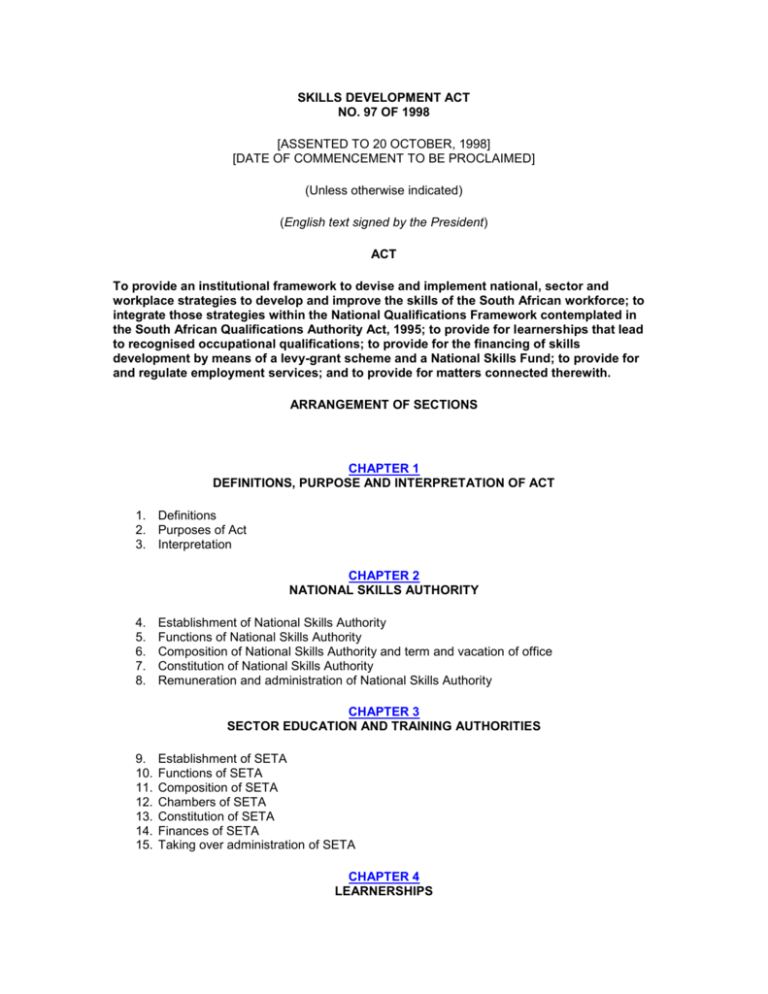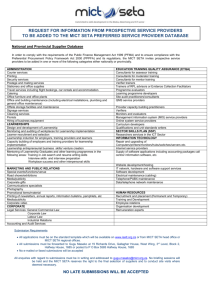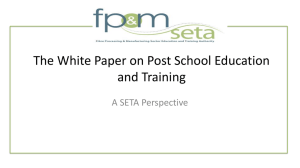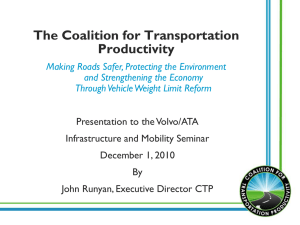Skills Development Act
advertisement

SKILLS DEVELOPMENT ACT NO. 97 OF 1998 [ASSENTED TO 20 OCTOBER, 1998] [DATE OF COMMENCEMENT TO BE PROCLAIMED] (Unless otherwise indicated) (English text signed by the President) ACT To provide an institutional framework to devise and implement national, sector and workplace strategies to develop and improve the skills of the South African workforce; to integrate those strategies within the National Qualifications Framework contemplated in the South African Qualifications Authority Act, 1995; to provide for learnerships that lead to recognised occupational qualifications; to provide for the financing of skills development by means of a levy-grant scheme and a National Skills Fund; to provide for and regulate employment services; and to provide for matters connected therewith. ARRANGEMENT OF SECTIONS CHAPTER 1 DEFINITIONS, PURPOSE AND INTERPRETATION OF ACT 1. Definitions 2. Purposes of Act 3. Interpretation CHAPTER 2 NATIONAL SKILLS AUTHORITY 4. 5. 6. 7. 8. Establishment of National Skills Authority Functions of National Skills Authority Composition of National Skills Authority and term and vacation of office Constitution of National Skills Authority Remuneration and administration of National Skills Authority CHAPTER 3 SECTOR EDUCATION AND TRAINING AUTHORITIES 9. 10. 11. 12. 13. 14. 15. Establishment of SETA Functions of SETA Composition of SETA Chambers of SETA Constitution of SETA Finances of SETA Taking over administration of SETA CHAPTER 4 LEARNERSHIPS 16. 17. 18. 19. Learnerships Learnership agreements Contract of employment with learner Disputes about learnerships CHAPTER 5 SKILLS PROGRAMMES 20. Skills programmes 21. Disputes CHAPTER 6 INSTITUTIONS IN DEPARTMENT OF LABOUR 22. 23. 24. 25. 26. Skills Development Planning Unit Employment services Registration of persons that provide employment services Cancellation of registration of employment service Appeal against Director-General's decision CHAPTER 7 FINANCING SKILLS DEVELOPMENT 27. 28. 29. 30. National Skills Fund Use of money in Fund Control and administration of Fund Budget for training by public service employers CHAPTER 8 GENERAL 31. 32. 33. 34. 35. 36. 37. 38. 39. 31. Jurisdiction of Labour Court Monitoring, enforcement and legal proceedings Offences Penalties Delegation Regulations Repeal of laws and transitional provisions Act binds State Short title and commencement Schedule 1 Repeal of laws Schedule 2 Transitional provisions CHAPTER 1 DEFINITIONS, PURPOSE AND APPLICATION OF ACT 1. Definitions.--In this Act, unless the context otherwise indicates-"Basic Conditions of Employment Act" means the Basic Conditions of Employment Act, 1997 (Act No. 75 of 1997); "Department" means the Department of Labour; "Director-General" means the Director-General of Labour; "employee" means-a. any person, excluding an independent contractor, who works for another person or for the State and who receives, or is entitled to receive, any remuneration; or b. any other person who in any manner assists in carrying on or conducting the business of an employer, and "employed" and "employment" have corresponding meanings; "employment services" means the provision of the service of-a. advising or counselling of workers on career choices either by the provision of information or other approaches; b. assessment of work-seekers for-i. entry or re-entry into the labour market; or ii. education and training; c. the reference of work-seekers-i. to employers to apply for vacancies; or ii. to training providers for education and training; d. assistance of employers by-i. providing recruitment and placement services; ii. advising them on the availability of work-seekers with skills that match their needs; iii. (advising them on the retrenchment of employees and the development of social plans; or e. any other prescribed employment service; "government department" means any department or organisational component referred to in Schedule 1 or 2 of the Public Service Act, 1994 (Proclamation No. 103 of 1994); "Labour Court" means the Labour Court established by section 151 of the Labour Relations Act, 1995 (Act No. 66 of 1995); "Minister" means the Minister of Labour; "National Skills Authority" means the National Skills Authority established by section 4; "national skills development policy" means the national skills development policy referred to in section 5 (1) (a) (i); "national skills development strategy" means the national skills development strategy referred to in section 5 (1) (a) (ii); "National Skills Fund" means the National Skills Fund established by section 27; "NEDLAC" means the National Economic Development and Labour Council established by section 2 of the National Economic Development and Labour Council Act, 1994 (Act No. 35 of 1994); "prescribed" means prescribed by regulation; "regulation" means a regulation made and in force in terms of section 36; "SETA" means a sector education and training authority established in terms of section 9 (1); "Skills Development Levies Act" means national legislation imposing levies for skills development; "skills development levies" means the skills development levies payable in terms of the Skills Development Levies Act; "South African Qualifications Authority" means the South African Qualification Authority established by section 3 of the South African Qualifications Authority Act; "South African Qualifications Authority Act" means the South Africa Qualifications Authority Act, 1995 (Act No. 58 of 1995); "this Act" includes any regulations but does not include the footnotes; and "worker" includes an employee, an unemployed person and a work-seeker. (Date of commencement of s. 1: 2 February, 1999.) 2. Purposes of Act.--(1) The purposes of this Act are-(a) to develop the skills of the South African workforce-i. ii. iii. iv. to improve the quality of life of workers, their prospects of work and labour mobility; to improve productivity in the workplace and the competitiveness of employers; to promote self-employment; and to improve the delivery of social services; (b) to increase the levels of investment in education and training in the labour market and to improve the return on that investment; (c) to encourage employers-i. ii. iii. iv. to use the workplace as an active learning environment; to provide employees with the opportunities to acquire new skills; to provide opportunities for new entrants to the labour market to gain work experience; and to employ persons who find it difficult to be employed; (d) to encourage workers to participate in learnership and other training programmes; (e) to improve the employment prospects of persons previously disadvantaged by unfair discrimination and to redress those disadvantages through training and education; ( f ) to ensure the quality of education and training in and for the workplace; (g) to assist-i. ii. iii. work-seekers to find work; retrenched workers to re-enter the labour market; employers to find qualified employees; and (h) to provide and regulate employment services. (2) Those purposes are to be achieved by-(a) establishing an institutional and financial framework comprising-i. ii. iii. iv. v. vi. the National Skills Authority; the National Skills Fund; a skills development levy-grant scheme as contemplated in the Skills Development Levies Act; SETAs; labour centres; and the Skills Development Planning Unit; (b) encouraging partnerships between the public and private sectors of the economy to provide education and training in and for the workplace; and (c) co-operating with the South African Qualifications Authority. (Date of commencement of s. 2: 2 February, 1999.) 3. Interpretation.--Any person applying this Act must interpret its provisions to give effect to-(a) its purposes; and (b) the objects of the South African Qualifications Authority Act. (Date of commencement of s. 3: 2 February, 1999.) CHAPTER 2 NATIONAL SKILLS AUTHORITY 4. Establishment of National Skills Authority.--The National Skills Authority is hereby established. (Date of commencement: 2 February, 1999.) 5. Functions of National Skills Authority.--(1) The functions of the National Skills Authority are-(a) to advise the Minister on-i. ii. iii. a national skills development policy; a national skills development strategy; guidelines on the implementation of the national skills development strategy; iv. v. the allocation of subsidies from the National Skills Fund; and any regulations to be made; (b) to liaise with SETAs on-i. ii. the national skills development policy; and (the national skills development strategy; (c) to report to the Minister in the prescribed manner on the progress made in the implementation of the national skills development strategy; (d) to conduct investigations on any matter arising out of the application of this Act; and (e) to exercise any other powers and perform any other duties conferred or imposed on the Authority by this Act. (2) For the purposes of investigations referred to in subsection (1) (d), the Authority has the prescribed powers of entry and to question and inspect. (3) The Authority must perform its functions in accordance with this Act and its constitution. (Date of commencement of s. 5: 2 February, 1999.) 6. Composition of National Skills Authority and term and vacation of office.--(1) The National Skills Authority consists of-a. a voting chairperson appointed by the Minister; b. 24 voting and three non-voting members appointed by the Minister; and c. its non-voting executive officer appointed in terms of section 8 (2) (a). (2) The members referred to in subsection (1) (b) are-a. five voting members nominated by NEDLAC and appointed by the Minister to represent organised labour; b. five voting members nominated by NEDLAC and appointed by the Minister to represent organised business; c. five voting members nominated by NEDLAC and appointed by the Minister to represent organisations of community and development interests, which must include-i. a woman who represents the interests of women; ii. a person who represents the interests of the youth; and iii. a disabled person who represents the interests of people with disabilities; d. five voting members appointed by the Minister to represent the interests of the State; e. four voting members appointed by the Minister to represent the interests of education and training providers; f. two non-voting members, who have expertise in the provision of employment services, appointed by the Minister; and g. a non-voting member nominated by the South African Qualifications Authority and appointed by the Minister to represent that Authority. (3) The Minister must designate four members as deputy chairpersons, one deputy chairperson each from the members to be appointed to represent-- a. b. c. d. organised labour; organised business; organisations of community and development interests; and the interests of the State. (4) A member of the Authority holds office for a period of three years and is eligible for reappointment. (5) A member of the Authority vacates office if that member-a. is removed from office by the Minister as contemplated in subsection (6); or b. resigns by written notice addressed to the Minister. (6) The Minister may remove a member of the Authority-a. b. c. d. on the written request of the body that nominated that member in terms of subsection (2); for serious misconduct; for permanent incapacity; for absence from three consecutive meetings of the Authority-i. without the prior permission of the Authority; or e. unless the member shows good cause; or f. for engaging in any activity that may undermine the functions of the Authority. (7) If a member of the Authority vacates office before the expiry of the period of office, the Minister must, in terms of subsection (2), appoint a new member for the unexpired portion of that period. (Date of commencement of s. 6: 2 February, 1999.) 7. Constitution of National Skills Authority.--(1) The National Skills Authority must, as soon as possible after the appointment of its members, adopt its constitution. (2) Subject to this Act, the constitution of the Authority-a. must provide for-i. procedures for the nominations of members of the Authority referred to in section 6 (2) (a), (b), (c) and (g); ii. the establishment and functioning of committees, including an executive committee; iii. subject to subsection (3), the rules for convening and conducting of meetings of the Authority and its committees, including the quorum required for and the minutes to be kept of those meetings; iv. the voting rights of the different members and the manner in which decisions are to be taken by the Authority and its committees; v. a code of conduct for the members of the Authority; vi. the determination through arbitration of any dispute concerning the interpretation or application of the constitution; and vii. subject to subsections (4) and (5), a procedure for amending the constitution and advising the Minister on regulations to be made; and b. may provide for-i. the delegation of powers and duties of the Authority to its members, committees and employees, provided that the Authority may impose conditions for the delegation, may not be divested of any power or duty by virtue of the delegation and may vary or set aside any decision made under any delegation; and ii. any other matter necessary for the performance of the functions of the Authority. (3) At least 30 days notice must be given for a meeting of the Authority at which an amendment of the constitution or a regulation to be made is to be considered. (4) A supporting vote of at least two thirds of the Authority's members and the approval of the Minister is required for an amendment to its constitution. (5) A supporting vote of at least two-thirds of the Authority's members is required for advising the Minister on regulations to be made. (6) Despite subsection (2) (a) (i), the Minister must determine the procedure for the nominations for the first appointment of members of the Authority referred to in section 6 (2) (a), (b), (c) and (g). (Date of commencement of s. 7: 2 February, 1999.) 8. Remuneration and administration of National Skills Authority.--(1) A member of the National Skills Authority who is not in the full-time employment of the State may be paid the remuneration and allowances determined by the Minister with the approval of the Minister of Finance. (2) Subject to the laws governing the public service, the Director-General must-a. appoint a person to be the executive officer of the National Skills Authority who will, upon such appointment, be in the employ of the public service; and b. provide the Authority with the personnel and financial resources that the Minister considers necessary for the performance of its functions. (Date of commencement of s. 8: 2 February, 1999.) CHAPTER 3 SECTOR EDUCATION AND TRAINING AUTHORITIES 9. Establishment of SETA.--(1) The Minister may, in the prescribed manner, establish a sector education and training authority with a constitution for any national economic sector. (2) The Minister must determine a discrete sector for the purposes of subsection (1) by reference to categories of employers and for the purposes of that determination take into account-a. the education and training needs of employers and employees that-i. use similar materials, processes and technologies; ii. make similar products; or iii. render similar services; b. the potential of the proposed sector for coherent occupational structures and career pathing; c. the scope of any national strategies for economic growth and development; d. the organisational structures of the trade unions, employer organisations and government in closely related sectors; e. any consensus that there may be between organised labour, organised employers and relevant government departments as to the definition of any sector; and f. the financial and organisational ability of the proposed sector to support a SETA. (3) On the establishment of a SETA, the Minister may provide assistance to the SETA to enable it to perform its functions. 10. Functions of SETA.--(1) A SETA must-a. develop a sector skills plan within the framework of the national skills development strategy; b. implement its sector skills plan by-i. establishing learnerships; ii. approving workplace skills plans; iii. allocating grants in the prescribed manner to employers, education and training providers and workers; and iv. monitoring education and training in the sector; c. promote learnerships by-i. identifying workplaces for practical work experience; ii. supporting the development of learning materials; iii. improving the facilitation of learning; and iv. assisting in the conclusion of learnership agreements; d. register learnership agreements; e. within a week from its establishment, apply to the South African Qualifications Authority for accreditation as a body contemplated in section 5 (1) (a) (ii) (bb) and must, within 18 months from the date of that application, be so accredited; f. collect and disburse the skills development levies in its sector; g. liaise with the National Skills Authority on-i. the national skills development policy; ii. the national skills development strategy; and iii. its sector skills plan; h. report to the Director-General on-i. its income and expenditure; and ii. the implementation of its sector skills plan; i. liaise with the employment services of the Department and any education body established under any law regulating education in the Republic to improve information-i. about employment opportunities; and ii. between education and training providers and the labour market; j. appoint staff necessary for the performance of its functions; and k. perform any other duties imposed by this Act or consistent with the purposes of this Act. (2) A SETA has-a. all such powers as are necessary to enable it to perform its duties referred to in subsection (1); and b. the other powers conferred on the SETA by this Act. (3) A SETA must perform its functions in accordance with this Act and its constitution. 11. Composition of SETA.--A SETA may consist only of members representing-a. b. c. d. organised labour; organised employers, including small business; relevant government departments; and if the Minister, after consultation with the members referred to in paragraph (a), (b) and (c), considers it appropriate for the sector-i. any interested professional body; ii. any bargaining council with jurisdiction in the sector. 12. Chambers of SETA.--(1) A SETA may, with the Minister's approval, establish in its sector chambers. (2) A chamber so established must consist of an equal number of members representing employees and employers and may include such additional members as the SETA determines. (3) That chamber must perform those functions of the SETA as delegated to it in terms of the constitution of the SETA. (4) A chamber of a SETA is entitled to such percentage of the skills development levies collected in its jurisdiction as the Minister after consultation with the SETA determines. 13. Constitution of SETA.--(1) For the purpose of the establishment of a SETA, the Minister must approve the constitution of the SETA. (2) The Minister may, after consultation with the SETA, amend its constitution in the prescribed manner. (3) Subject to this Act, the constitution of a SETA-a. must specify-i. the trade unions, employer organisations and relevant government departments in the sector; ii. the circumstances and manner in which a member of SETA may be replaced; iii. the number of members to be appointed to the SETA, provided that the SETA must consist of an equal number of members representing employees and employers; iv. the procedure for the replacement of a member of the SETA by the organisation that nominated that member; v. the circumstances and manner in which a member may be replaced by the SETA; vi. the election of office-bearers by the members of the SETA and of persons to act during their absence or incapacity, their term of office and functions and the circumstances and manner in which they may be replaced; vii. the establishment and functioning of committees, including an executive committee; viii. the rules for convening and conducting of meetings of the SETA and its chambers and committees, including the quorum required for and the minutes to be kept of those meetings; ix. the voting rights of the different members and the manner in which decisions are to be taken by the SETA and its chambers and committees; x. a code of conduct for members of the SETA and its chambers; xi. the appointment of an executive officer, and such other employees necessary for the effective performance of the functions of the SETA, by its members, including the determination of their terms and conditions of employment; and xii. the determination through arbitration of any dispute concerning the interpretation or application of the constitution; and b. may provide for-i. the delegation of powers and duties of the SETA to its members, chambers, committees and employees, provided that the SETA may impose conditions for the delegation, may not be divested of any power or duty by virtue of the delegation and may vary or set aside any decision made under any delegation; and ii. any other matter necessary for the performance of the functions of the SETA. 14. Finances of SETA.--(1) A SETA is financed from-a. b. c. d. e. f. the skills development levies collected in its sector; moneys paid to it from the National Skills Fund; grants, donations and bequests made to it; income earned on surplus moneys deposited or invested; income earned on services rendered in the prescribed manner; and money received from any other source. (2) The money received by a SETA must be paid into a banking account at any registered bank and may be invested only in-a. savings accounts, permanent shares or fixed deposits in any registered bank or other financial institution; b. internal registered stock contemplated in section 21 (1) of the Exchequer Act, 1975 (Act No. 66 of 1975); c. a unit trust scheme managed by a company which has been registered as a management company in terms of section 4 or 30 of the Unit Trusts Control Act, 1981 (Act No. 54 of 1981); and d. any other manner approved by the Minister. (3) The moneys received by a SETA may be used only in the prescribed manner and to-a. fund the performance of its functions; and b. pay for its administration within the prescribed limit. (4) In each financial year, ending on the prescribed date, every SETA must, at a time determined by the Minister, submit to the Minister a statement of the SETA's estimated income and expenditure for the following financial year. (5) Every SETA must, in accordance with the standards of generally accepted accounting practice-a. keep proper record of all its financial transactions, assets and liabilities; and b. within six months after the end of each financial year, prepare accounts reflecting income and expenditure and a balance sheet showing its assets, liabilities and financial position as at the end of that financial year. (6) The Auditor-General must-a. audit the accounts, financial statements and financial management of a SETA; and b. report on that audit to the SETA and to the Minister and in that report express an opinion as to whether the SETA has complied with the provisions of this Act, and its constitution, relating to financial matters. 15. Taking over administration of SETA.--(1) The Minister may, after consultation with the National Skills Authority, by notice in the Gazette, direct the Director-General to appoint an administrator to take over the administration of a SETA if the Minister is of the opinion that-a. the SETA fails to perform its functions; b. there is mismanagement of its finances; or c. its membership no longer substantially represents the composition contemplated in section 11. (2) In that notice the Minister-a. must determine the powers and duties of the administrator appointed in terms of subsection (1); b. may suspend or replace one or more members of the SETA for a reason contemplated in subsection (1) (a), (b) or (c); c. may suspend the operation of the constitution of the SETA; and d. may, in the prescribed manner, transfer funds in the SETA's bank account to the National Skills Fund. (3) If a notice is published in terms of subsection (1), the Minister may, to ensure that the SETA resumes the performance of its functions-a. amend its constitution; b. reinstate any of its members; and c. withdraw or amend any provision of the notice contemplated in subsection (2) on such conditions as the Minister considers appropriate. CHAPTER 4 LEARNERSHIPS 16. Learnerships.--A SETA may establish a learnership if-a. the learnership consists of a structured learning component; the learnership includes practical work experience of a specified nature and duration; b. the learnership would lead to a qualification registered by the South African Qualifications Authority and related to an occupation; and c. the intended learnership is registered with the Director-General in the prescribed manner. 17. Learnership agreements.--(1) For the purposes of this Chapter, a "learnership agreement" means an agreement entered into for a specified period between-a. a learner; b. an employer or a group of employers (in this section referred to as "the employer"); and c. a training provider accredited by a body contemplated in section 5 (1) (a) (ii) (bb) of the South African Qualifications Authority Act or group of such training providers. (2) The terms of a learnership agreement must oblige-a. the employer to-i. employ the learner for the period specified in the agreement; ii. provide the learner with the specified practical work experience; and iii. release the learner to attend the education and training specified in the agreement; b. the learner to-i. work for the employer; and ii. attend the specified education and training; and c. the training provider to provide-i. the education and training specified in the agreement; and ii. the learner support specified in the agreement. (3) A learnership agreement must be in the prescribed form and registered with a SETA in the prescribed manner. (4) A learnership agreement may not be terminated before the expiry of the period of duration specified in the agreement unless-a. the learner meets the requirements for the successful completion of the learnership; b. the SETA which registered the agreement approves of such termination; or c. the learner is fairly dismissed for a reason related to the learner's conduct or capacity as an employee. (5) The employer or training provider that is party to a learnership agreement may be substituted with-a. the consent of the learner; and b. the approval of the SETA which registered the agreement. (6) A SETA must, in the prescribed manner, provide the Director-General with a record of learnership agreements registered by the SETA. 18. Contract of employment with learner.--(1) If a learner was in the employment of the employer party to the learnership agreement concerned when the agreement was concluded, the learner's contract of employment is not affected by the agreement. (2) If the learner was not in the employment of the employer party to the learnership agreement concerned when the agreement was concluded, the employer and learner must enter into a contract of employment. (3) The contract of employment with a learner contemplated in subsection (2) is subject to any terms and conditions that may be determined by the Minister on the recommendation of the Employment Conditions Commission established by section 59 (1) of the Basic Conditions of Employment Act. (4) Chapters Eight and Nine1 of the Basic Conditions of Employment Act apply, with the changes required by the context, to a determination made in terms of subsection (3) except that-a. for the purposes of section 54 (3) of that Act, the Employment Conditions Commission must also consider the likely impact that any proposed condition of employment may have on the employment of learners and the achievement of the purposes of this Act; and b. section 55 (7) of that Act does not apply. (5) The contract of employment of a learner may not be terminated before the expiry of the period of duration specified in the learnership agreement unless the learnership agreement is terminated in terms of section 17 (4). (6) The contract of employment of a learner terminates at the expiry of the period of duration specified in the learnership agreement unless the agreement was concluded with a person who was already in the employment of the employer party to the agreement when the agreement was concluded. 19. Disputes about learnerships.--(1) For the purposes of this section a "dispute" means a dispute about-a. the interpretation or application of any provision of-i. a learnership agreement; ii. (a contract of employment of a learner; or iii. a determination made in terms of section 18 (3); b. this Chapter; or c. the termination of-i. a learnership agreement; or ii. a contract of employment of a learner. (2) Any party to a dispute may in writing refer the dispute to the Commission for Conciliation, Mediation and Arbitration established by section 112 of the Labour Relations Act, 1995 (Act No. 66 of 1995). (3) The party who so refers the dispute must satisfy that Commission that a copy of the referral has been served on all the other parties to the dispute. (4) The Commission must attempt to resolve the dispute through conciliation. (5) If the dispute remains unresolved, any party may request that the dispute be resolved through arbitration as soon as possible. (6) The law that applies to the lawfulness2 and fairness3 of a dismissal for a reason related to an employee's capacity or conduct applies to a dispute contemplated in subsection (1) (c) (ii). CHAPTER 5 SKILLS PROGRAMMES 20. Skills programmes.--(1) For the purposes of this Chapter, a "skills programme" means a skills programme that-a. is occupationally based; b. when completed, will constitute a credit towards a qualification registered in terms of the National Qualifications Framework as defined in section 1 of the South African Qualifications Authority Act; c. uses training providers referred to in section 17 (1) (c); or d. complies with the prescribed requirements. (2) Any person that has developed a skills programme may apply to-a. a SETA with jurisdiction for a grant; or b. the Director-General for a subsidy. (3) The SETA or the Director-General may fund the skills programme if-a. it complies with-i. subsection (1); ii. any requirements imposed by the SETA or the Director-General; and iii. any prescribed requirements; and b. it is in accordance with-i. the sector skills development plan of the SETA; or ii. the national skills development strategy; and c. there are funds available. (4) A SETA or the Director-General may set any terms and conditions for funding in terms of subsection (3) that the SETA or the Director-General, as the case may be, considers necessary. (5) The SETA or the Director-General must monitor the skills programmes funded by the SETA or the Director-General, as the case may be. (6) A SETA or the Director-General that has made funds available for a skills programme may withhold funds or recover any funds paid if the SETA or the Director-General, as the case may be, is of the opinion that-a. the funds are not being used for the purpose for which they were made available; b. any term or condition of the funding is not complied with; or c. the SETA or the Director-General, as the case may be, is not satisfied that the training is up to standard. 21. Disputes.--Any party to a dispute about the application or interpretation of-a. any term or condition of funding referred to in section 20 (4); or b. any provision of this Chapter, may refer the dispute to the Labour Court for adjudication. CHAPTER 6 INSTITUTIONS IN DEPARTMENT OF LABOUR 22. Skills Development Planning Unit.--(1) Subject to the laws governing the public service, the Director-General must-a. establish a Skills Development Planning Unit in the Department; and b. provide the Unit with the personnel and financial resources necessary for the performance of its functions. (2) The functions of the Skills Development Planning Unit are-a. to research and analyse the labour market in order to determine skills development needs for-i. South Africa as a whole; ii. each sector of the economy; and iii. organs of state; b. to assist in the formulation of-i. the national skills development strategy; and ii. sector skills development plans; and c. to provide information on skills to-i. the Minister; ii. the National Skills Authority; iii. SETAs; iv. education and training providers; and v. organs of state. 23. Employment services.--(1) Subject to the laws governing the public service, the DirectorGeneral must-a. establish labour centres in the Department; and b. appoint such number of persons in the public service at each centre as is necessary to perform the functions of that centre. (2) The functions of those labour centres are-a. to provide employment services for workers, employers and training providers, including improvement of such services to rural communities; b. to register work-seekers; c. to register vacancies and work opportunities; d. to assist prescribed categories of persons-i. to enter special education and training programmes; ii. to find employment; iii. to start income-generating projects; and iv. to participate in special employment programmes; and e. to perform any other prescribed function related to the functions referred to in paragraphs (a) to (d). (3) The Minister may, after consulting the National Skills Authority, by notice in the Gazette, require each employer to notify a labour centre in the prescribed manner of-a. any vacancy that employer has; and b. the employment of any work-seeker referred by that labour centre. 24. Registration of persons that provide employment services.--(1) Any person who wishes to provide employment services for gain must apply for registration to the Director-General in the prescribed manner. (2) The Director-General must register the applicant if satisfied that the prescribed criteria have been met. (3) If the Director-General-a. registers an applicant, the prescribed certificate must be issued to that person; or b. refuses to register an applicant, the Director-General must give written notice of that decision to the applicant. (4) A registered employment service must comply with the prescribed criteria. 25. Cancellation of registration of employment service.--(1) Subject to this section, the Director-General may cancel the registration of an employment service if satisfied that the employment service is not complying with the prescribed criteria. (2) If the Director-General has reason to believe that an employment service is not complying with the prescribed criteria and accordingly that its registration should be cancelled, the DirectorGeneral must, before cancelling its registration-a. notify the service of the intention to cancel registration and the reasons for doing so; b. give the service 30 days from the date of the notice to make representations on why its registration should not be cancelled; and c. take those representations into account in reaching a decision. (3) If the Director-General cancels the registration of an employment service, the DirectorGeneral must give written notice of that decision to the employment service. 26. Appeal against Director-General's decision.--(1) Any person aggrieved by a decision of the Director-General in terms of section 24 (3) (b) or 25 (3) may, within 30 days of the written notice of that decision, in writing, request the Director-General to give that person written reasons for the decision. (2) The Director-General must give that person written reasons for the decision within 30 days of receiving that request. (3) Any person aggrieved by a decision of the Director-General in terms of section 24 (3) (b) or 25 (3) may appeal to the Labour Court against that decision within 60 days of-a. the date of the Director-General's decision; or b. if written reasons for the decision are requested, the date of those reasons. (4) The Labour Court may, on good cause shown, extend the period within which a person may note that appeal. CHAPTER 7 FINANCING SKILLS DEVELOPMENT 27. National Skills Fund.--(1) The National Skills Fund is hereby established. (2) The Fund must be credited with-a. 20 per cent of the skills development levies as contemplated in the Skills Development Levies Act; (Date of commencement of paragraph (a) to be proclaimed.) b. the skills development levies collected and transferred to the Fund, in terms of the Skills Development Levies Act, in respect of those sectors in which there are no SETAs; (Date of commencement of paragraph (b) to be proclaimed.) a. b. c. d. money appropriated by Parliament for the Fund; interest earned on investments contemplated in section 29 (3); donations to the Fund; and money received from any other source. (Date of commencement of s. 27: 2 February, 1999.) 28. Use of money in Fund.--The money in the Fund may be used only for the projects identified in the national skills development strategy as national priorities or for such other projects related to the achievement of the purposes of this Act as the Director-General determines. (Date of commencement: 2 February, 1999.) 29. Control and administration of Fund.--(1) The Director-General is the accounting officer of the Fund in terms of the Exchequer Act, 1975 (Act No. 66 of 1975) and must-a. control the Fund; b. keep a proper record of all financial transactions, assets and liabilities of the Fund; and c. as soon as possible after the end of each financial year, ending on the prescribed date, prepare accounts of the income and expenditure of the Fund for the year and a balance sheet of its assets and liabilities as at the end of that year. (2) Any money in the Fund not required for immediate use may be invested with the Public Investment Commissioner or with a financial institution approved by the Minister and may be withdrawn when required. (3) Any unexpended balance in the Fund at the end of the financial year must be carried forward to the next financial year as a credit to the Fund. (Date of commencement of s. 29: 2 February, 1999.) 30. Budget for training by public service employers.--Each public service employer in the national and provincial spheres of government-a. must budget for at least one per cent of its payroll for the training and education of their employees with effect from 1 April 2000; and b. may contribute funds to a SETA. CHAPTER 8 GENERAL 31. Jurisdiction of Labour Court.--(1) Subject to the jurisdiction of the Labour Appeal Court and except where this Act provides otherwise, the Labour Court has exclusive jurisdiction in respect of all matters arising from this Act. (2) The Labour Court may review any act or omission of any person in connection with this Act on any grounds permissible in law. (3) If proceedings concerning any matter contemplated in subsection (1) are instituted in a court that does not have jurisdiction in respect of that matter, that court may at any stage during proceedings refer the matter to the Labour Court. 32. Monitoring, enforcement and legal proceedings.--Chapter Ten and Schedule Two of the Basic Conditions of Employment Act apply, with changes required by the context, to-a. the monitoring and enforcement of this Act; and b. any legal proceedings concerning a contravention of this Act. 33. Offences.--It is an offence to-a. obstruct or attempt to influence improperly a person who is performing a function in terms of this Act; b. obtain or attempt to obtain any prescribed document by means of fraud, false pretences or by submitting a false or forged prescribed document; c. furnish false information in any prescribed document knowing that information to be false; or d. provide employment services for gain without being registered in terms of section 24. 34. Penalties.--Any person convicted of an offence referred to in section 33 may be sentenced to a fine or imprisonment for a period not exceeding one year. 35. Delegation.--(1) The Minister may in writing delegate to the Director-General or any other officer of the Department any power or duty conferred or imposed on the Minister by this Act. (2) The Director-General may, in writing, delegate to any officer of the Department any power or duty conferred or imposed on the Director-General by this Act. (3) Any person to whom any power or duty has been delegated in terms of subsection (1) or (2) must exercise that power or perform that duty subject to the conditions that the person who made the delegation considers necessary. (4) Any delegation in terms of subsection (1) or (2)-a. must be in writing; b. does not prevent the person who made the delegation from exercising the power or performing the duty so delegated; and c. may at any time be withdrawn in writing by that person. 36. Regulations.--The Minister may, after consultation with the National Skills Authority, by notice in the Gazette, make regulations relating to any matter which-a. may or must be prescribed under this Act; and b. is necessary to prescribe in order to achieve the purposes of this Act. 37. Repeal of laws and transitional provisions.--(1) The laws referred to Schedule 1 are hereby repealed to the extent specified. (2) The repeal of those laws is subject to any transitional provision in Schedule 2. 38. Act binds State.--This Act binds the State. 39. Short title and commencement.--(1) This Act is called the Skills Development Act, 1998. (2) This Act takes effect on a date to be determined by the President by proclamation in the Gazette. Schedule 1 REPEAL OF LAWS (Section 37 (1)) No. and year of law Short title Extent of repeal Act No. 56 of 1981 Manpower Training Act, 1981 The whole. Act No. 62 of 1981 Guidance and Placement Act, 1981 The whole. Act No. 41 of 1985 Local Government Training Act, 1985 The whole Act No. 106 of 1996 Telecommunications Act, 1996 Sections 78 to 87. Schedule 2 TRANSITIONAL PROVISIONS (Section 37 (2)) 1. Definitions.--In this Part-"Guidance and Placement Act" means the Guidance and Placement Act, 1981 (Act No. 62 of 1981); "Local Government Training Act" means the Local Government Training Act, 1985 (Act No. 41 of 1985); "Manpower Training Act" means the Manpower Training Act, 1981 (Act No. 56 of 1981); and "Telecommunications Act" means the Telecommunications Act, 1996 (Act No. 103 of 1996). 2. National Training Board.--Until the chairperson and other members of the National Skills Authority are appointed, the National Training Board, established in terms of section 3 of the Manpower Training Act, continues to exist and to perform the functions of the National Skills Authority. 3. Manpower Development Fund.--All assets, rights, liabilities and obligations of the Manpower Development Fund, established by section 38 of the Manpower Training Act, are hereby transferred to the National Skills Fund. 4. Training boards and apprenticeships.--(1) Subject to subitem (4), a training board, established and accredited in terms of sections 12A and 12B of the Manpower Training Act, continues to exist and perform its functions as if that Act had not been repealed, until 31 March 2000. (2) When a training board ceases to exist on 31 March 2000-a. that training board must be wound up in terms of its constitution; and b. any apprentice under a contract of apprenticeship, registered by that training board and in existence immediately before the training board ceases to exist, must be dealt with as if the Manpower Training Act had not been repealed except that the Director-General must perform the functions of the training board until that contract of apprenticeship expires. (3) The Minister must, by notice in the Gazette, abolish a training board before 31 March 2000 ifa. a SETA is established; and b. that SETA has jurisdiction over any part of an industry or area in respect of which the training board has been accredited in terms of section 12B of the Manpower Training Act. (4) When a training board is abolished in terms of a notice referred to in subitem (3)-a. all the assets, rights, liabilities and obligations of the training board are transferred to the SETA designated in that notice; and b. any apprentice under a contract of apprenticeship, registered by the training board and in existence immediately before the training board is abolished, must, subject to subitem (6), be dealt with as if the Manpower Training Act had not been repealed except that that SETA must perform the functions of the training board until the contract of apprenticeship expires. (5) Subject to sub-item (4) (b), sections 13 to 29 of the Manpower Training Act remains in force as if that Act had not been repealed until a date determined by the Minister by notice in the Gazette. (6) From the date immediately after the date referred to in sub-item (5)-a. any trade designated under section 13 (1) of the Manpower Training Act is regarded to be a qualification contemplated in section 16 (c) of this Act; b. the applicable provisions of any contract of apprenticeship registered in terms of section 18 of that Act are deemed to be a learnership agreement registered in terms of section 17 (3) of this Act and a contract of employment referred to in section 18 (3) of this Act; and c. any apprentice referred to in section 17 of that Act is regarded to be a learner in relation to such a learnership agreement. 5. Training centres.--(1) In this item "training centre" means any-a. centre registered as a regional training centre registered in terms of section 31 of the Manpower Training Act; b. training centre registered as an industry training centre in terms of section 34 of the Manpower Training Act; or c. training trust established in terms of any law mentioned in Schedule 1 of the Integration of Labour Laws Act, 1994 (Act No. 49 of 1994), and in existence immediately before the commencement of this Act. (2) Subject to subitem (3), a training centre continues to exist and perform its functions as if the Manpower Training Act or any law mentioned in Schedule 1 of the Act referred to in subitem (1) (b) had not been repealed. (3) A training centre must be liquidated4 in terms of its constitution not later than 31 March 2000 unless it has been registered as an association not for gain in terms of section 21 of the Companies Act, 1973 (Act No. 61 of 1973) before that date. (4) The Director-General may take steps to liquidate a training centre after 31 July 1999 if that centre has not-a. applied for registration as such an association not for gain; or b. taken steps to liquidate itself in terms of its constitution. (5) If a training centre is liquidated, any assets and rights not required to discharge the obligations and liabilities of that centre must be disposed of in accordance with the directions of the Director-General. (6) Section 32 of the Manpower Training Act remains in force as if the Manpower Training Act had not been repealed, until a date determined by the Minister by notice in the Gazette. 6. Arrangements for training of trainees.--Any arrangement contemplated in section 30 of the Manpower Training Act and in force immediately before the commencement of this Act remains in force as if the Manpower Training Act had not been repealed, until a date determined by the Minister by notice in the Gazette. 7. Grants-in-aid.--Section 35 of the Manpower Training Act remains in force as if the Manpower Training Act had not been repealed, until a date determined by the Minister by notice in the Gazette. 8. Fund for Training of Unemployed Persons.--(1) Any balance of the Fund for the Training of Unemployed Persons established by section 36A of the Manpower Training Act is hereby transferred to the National Skills Fund. (2) The balance so transferred may be used only for the training of unemployed persons. 9. Training schemes.--(1) Subject to subitem (2), any scheme declared binding in terms of section 39 (5) of the Manpower Training Act continues as if that Act had not been repealed. (2) Any such scheme must be discontinued not later than 31 March 2000 unless the scheme has been-a. registered as an association not for gain in terms of section 21 of the Companies Act, 1973 (Act No. 61 of 1973), before that date, provided that from that registration any notice issued in terms of section 39 (5) in respect of that scheme ceases to be in force; b. sold with the agreement of the members of the training board with jurisdiction over employers subject to the scheme before that date; or c. transferred to a SETA with the agreement of those members of the training board before that date. (3) If that scheme is discontinued, any assets and rights not required to discharge the obligations and liabilities of that scheme must be disposed of in accordance with the directions of the Director-General. 10. Training levies.--(1) Subject to subitem (2), section 39 of the Manpower Training Act remains in force as if the Manpower Training Act had not been repealed, until 31 March 2000. (2) A notice imposing a levy in terms of section 39 of the Manpower Training Act and issued, before or after the commencement of this Act-a. may be amended by the Minister, by notice in the Gazette, to provide that the levy be paid to a SETA designated in that notice; and b. ceases to be in force when withdrawn in terms of the Skills Development Levies Act. 11. Training advisers.--Sections 45 and 46 of the Manpower Training Act remain in force as if the Manpower Training Act had not been repealed, until a date determined by the Minister by notice in the Gazette. 12. Registered work-seekers.--Any work-seeker registered in terms of section 4 of the Guidance and Placement Act immediately before the commencement of this Act is regarded to be a registered work-seeker in terms of section 23 (2) (b). 13. Private employment offices.--Any private employment office registered in terms of section 15 of the Guidance and Placement Act immediately before the commencement of this Act is regarded to be an employment service registered for gain in terms of section 24 of this Act. 14. Local government sector.--(1) The Local Government Training Fund (in this item referred to as "the Fund"), established by section 7 of the Local Government Training Act continues to exist, subject to subitems (5) to (7), as if that Act had not been repealed. (2) Any body or institution, including a local government body, recognised as a training centre under section 9A of the Local Government Training Act immediately before the commencement of this Act, continues to be so recognised for a period of four months from that commencement as if the Local Government Training Act had not been repealed. (3) Subject to subitem (7) (c), any levy imposed in terms of section 10 of the Local Government Training Act and in force immediately before the commencement of this Act, remains in force until 31 March 2000 unless withdrawn before that date by the Minister in terms of section 2 (3) of the Skills Development Levies Act as if the Local Government Training Act had not been repealed. (4) Subject to subitem (7)-a. the powers conferred and duties imposed on the Training Board for Local Government Bodies established by section 2 of the Local Government Training Act may be exercised and must be performed by the Local Government Education and Training Board established in terms of section 12A of the Manpower Training Act; and b. all the assets, rights, liabilities and obligations of the Training Board for Local Government Bodies are hereby transferred to the Local Government Education and Training Board. (5) The Director-General: Constitutional Development must administer the Fund and is the accounting officer for the Fund. (6) The Minister for Provincial Affairs and Constitutional Development may, after consultation with the Local Government Education and Training Board, utilise the moneys in the Fund to fund any person or institution that in the opinion of the Minister can take action to develop the skills, knowledge, expertise or attitudes of a person elected to a municipal council or employed by a municipality. (7) When a SETA is established for the local government sector-a. the Local Government Education and Training Board ceases to exist; b. the assets, rights, liabilities and obligations of that Training Board must be transferred to that SETA; c. the levy referred to in subitem (3) is regarded to be a levy imposed in terms of section 39 (1) of the Manpower Training Act as mentioned in item 10; d. the Fund ceases to exist; and e. the Director-General: Constitutional Development must transfer any balance of moneys in the Fund into the banking account of that SETA. 15. Telecommunications sector.--(1) Subject to subitem (2), the Human Resources Fund referred to in section 78 (1) of the Telecommunications Act continues to exist as if sections 78 to 87 of that Act had not been repealed. (2) The Fund referred to in subitem (1) ceases to exist-a. on 31 March 2000; or b. on the establishment of a SETA with jurisdiction in the telecommunications sector. (3) If that Fund ceases to exist in terms of-a. subitem (2) (a), the balance of the money in the Fund must be transferred to the National Skills Fund; or b. subitem (2) (b), the balance of the money in the Fund must be transferred to the SETA referred to in that subitem. (4) Subject to subitem (5), the contributions contemplated in section 86 (1) of the Telecommunications Act which are in force immediately before the commencement of this Act, remain in force until 31 March 2000 as if that Act had not been repealed. (5) If a SETA with jurisdiction in the telecommunications sector is established, the contributions contemplated in subitem (4) must be credited to that SETA. 16. Exemptions from transfer duty, donations tax or any other tax.--Any transfer of assets or rights contemplated in this Schedule is exempt from transfer duty, donations tax or any other duty or tax.








